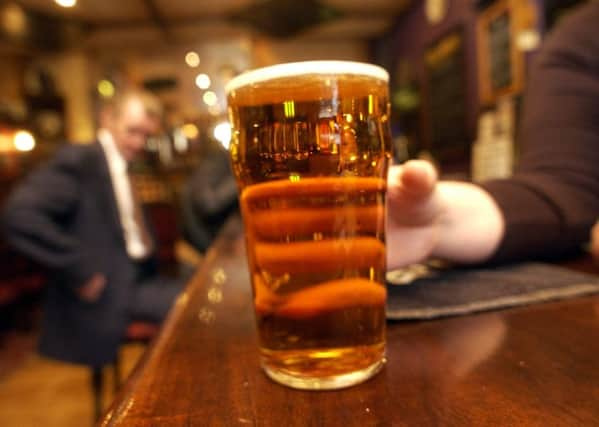Kenny MacAskill: Our struggling pubs need more support from the Government


The rise is across all commercial licensed premises. For some it’s possible to pass on part, or even all of it, even if customers complain. That’s not easy, though, as even big chains can be feeling the pinch and it seems the custom of the SNP branch was lost by the hotel as a consequence. Some critics responded by saying it was only big hoteliers who were paying the price. Some of course are, though they are also big employers creating work in many localities. Others, though, aren’t large operations but small businesses existing on tight margins. Moreover, not all Scotland has had the tourist boom from Hogmanay and many are facing rising costs not just on rates. I support a tourist tax but this is a tourist industry levy.
For others, passing on the burden is impossible and they’ll either have to soak it up or even face shutting down. It’s not just hotels that face the increase, but the pub trade where its tough times indeed. Pubs have been closing over many years and drinking patterns are changing in Scotland. This rates hike, on top of the existing business challenges, could prove too much for some.
Advertisement
Hide AdAdvertisement
Hide AdThe SNP have a good record in seeking to support commerce and especially small businesses. The small business bonus with the absence of rates for many businesses is very welcome. It helps sustain some High Street and other premises where otherwise units may lie empty or even more charity shops abound.
However, commercial licensed premises are asssessed differently. They’re not eligible for it. Commercial rates for the trade are calculated on turnover rather than square footage. That’s not faced by other retail premises, and results in huge anomalies.
It’s the crux of the matter and its being faced by most pubs and hotels across Scotland. This creates some huge anomalies with supermarkets assessed on footage facing modest rises and pubs and hotels done on turnover facing massive increases.
That despite the fact that, if its the sale of alcohol that’s the longstanding reasoning behind the methodology, supermarkets now sell far more. Three-quarters of alcohol sales in Scotland are now from the off-sale trade which is shops and stores, rather than from the on-sale trade of pubs, clubs and hotels; and it’s the big retailers who sell the most. Pubs are seeing their trade taken by the supermarkets through their large stores and small convenience outlets, but are being charged far more for the privilege of selling less alcohol than them.
It’s not a system that the SNP established as its long standing in the trade. However, the SNP are in power now and when the political music stops they’ve got to answer for it. The burden being faced down south is far less, and simply copying their scheme as an interim measure may offer a short-term fix until a long-term solution can be found.
If something isn’t done then many High Street and other local pubs will be lost. It won’t just be rural parts but urban areas that will become dry zones. That’ll be a blow to many communities where they’re part of the fabric of the area. They provide a service going beyond the selling of alcohol and provide everything from function rooms to social hubs. It might not be the school, but it is still a big loss.
Of course, some abuse the drinking of alcohol but at least it is supervised in the on-trade and remarkably well regulated. Home drinking or wherever off-site isn’t. This is why alcohol-fuelled offending has moved from in or near a licensed premise to the private home. The statistics bear that out. Pubs have a role to play in promoting sensible drinking and tackling the abuse of alcohol.
Some of the challenges, though, are probably insurmountable. There’s a generational change as young people have different social patterns. Moreover, people’s wants are different and many old pubs are simply out of vogue. Perhaps most significantly though, the cost differential between buying a carry-out or purchasing a round is substantial. It’s that difference which has really fuelled the change in drinking patterns.
Advertisement
Hide AdAdvertisement
Hide AdThe hurdles facing pubs are already considerable. I have to acknowledge my part in some of them. After all, along with other MSPs I voted for the smoking ban when it was brought in by the Lab/Lib coalition over a decade ago. However, no-one would want to go back to the smoke-filled howffs that once proliferated. The smell of stale tobacco holds no more fond memories now than it did after a night in the pub years ago.
I was also the instigator of the reduction in the drink-drive limit. This has undeniably had an affect on the trade. That said, I believe this move was essential to save lives and change attitudes. The trade does have a point though when it argues for the availability of a lower penalty for a breach of the law just over the new limit. However, there should be no variation in the strict penalities for those over the old limit or repeat offenders.
So, its been hard times for the pub trade. There is no simple fix but if the Scottish Government addressed the current rates rise crisis, that would be a start, pending a longer term solution. Finally, there needs to be a recognition that pubs have a role in our communities and that needs to be supported. It’s the off-sale trade that needs to be regulated more, and needs to shoulder most of the burden of tackling alcohol abuse.